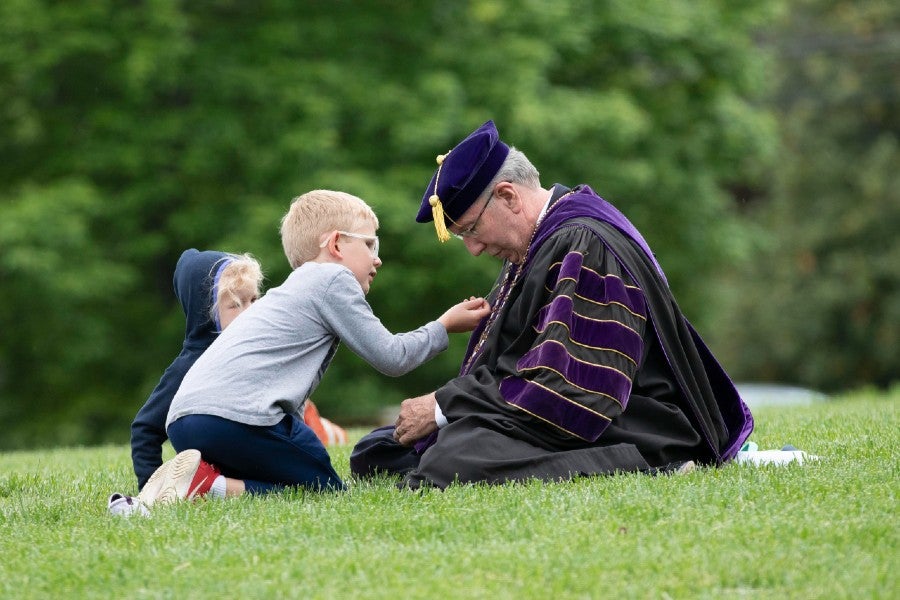President L. Randolph Lowry
Reflecting on 16 years of purposeful growth
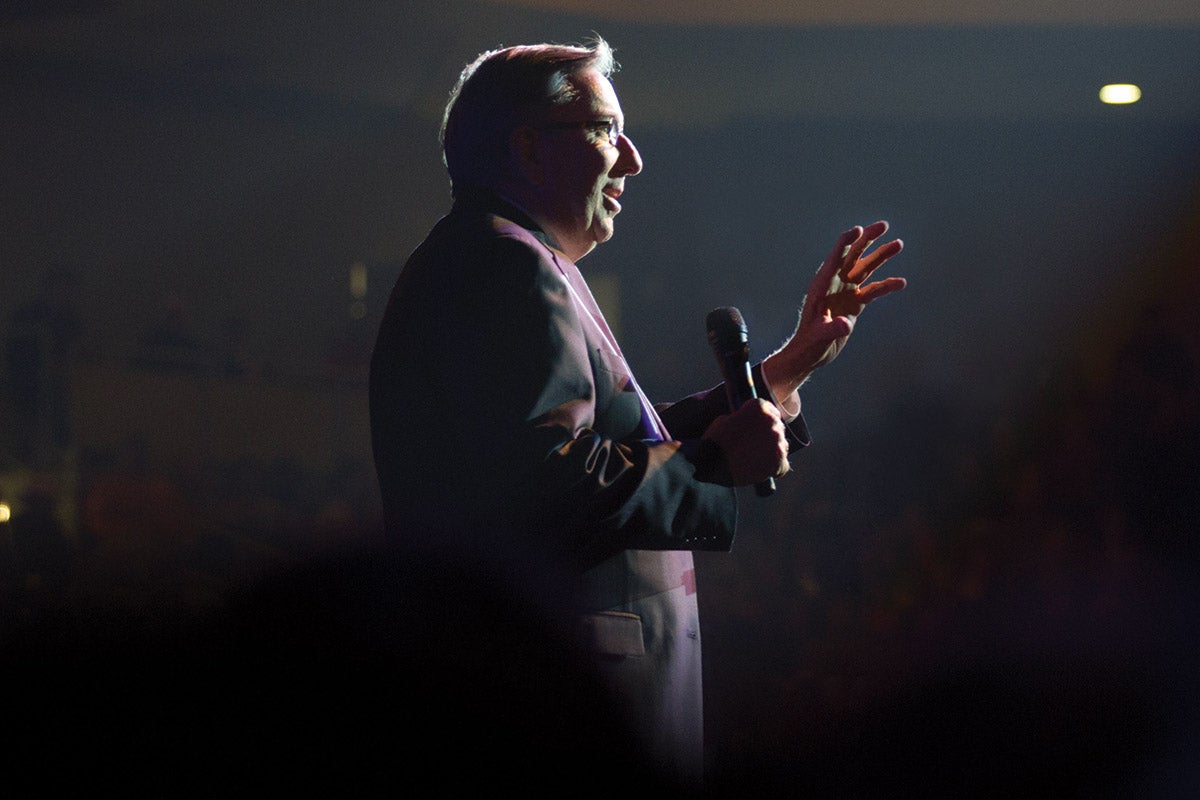
Photos by Kristi Jones
Sixteen years ago, Dr. L. Randolph Lowry took on the colors of a new institution, committing to make the purple and gold of Lipscomb his own.
In his last official Lipscomb Now interview before transitioning to his role as chancellor, Dr. Lowry reflects on how he has formed the Lipscomb of 2021 and how Lipscomb has formed him.
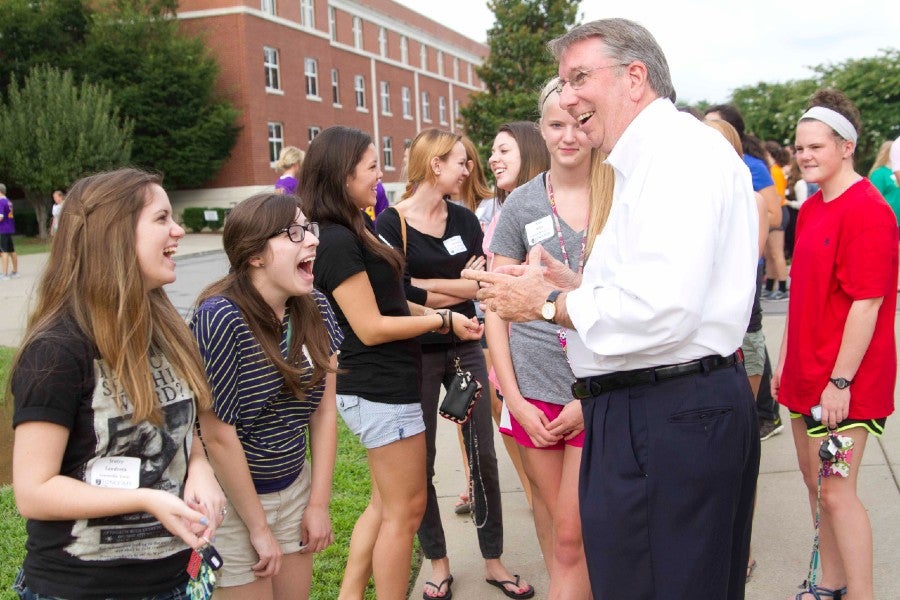
Lipscomb University has experienced 94% university enrollment growth since Lowry's arrival in fall 2005.
LN: Let’s go back to July 2005. What was going through your mind in July 2005 as you were preparing to move to Nashville, Tennessee, from Malibu?
RL: It was a good time for us because our last child had gone to college. Our children were in college so that made it a whole lot easier for us to think about doing this — at least the way we chose to do it — as a couple. At that time there were some exciting things going on in the institute at Pepperdine and I had just started a new consulting firm that was doing work in health care. But also there was the thought that the next 15 years or so were going to be pretty much what I had done for 19 years. I thought I still had enough in the gas tank that, you know, there was another stop on the career path. So it was exciting to think about something different.
Nashville was a bit of an adventure, too. We knew we were moving to a very different culture. In terms of the church, in terms of society ... I think we understood this was going to be a pretty substantial move. But we looked forward to it and were excited about it. This wasn’t the first time we moved. We had moved several times from Alberta, Canada, to Minneapolis, Minnesota, then from Minneapolis to Salem, Oregon, and finally moved from Salem back to Malibu. So it wasn't a crazy thing to say, we think we can do this!
You can’t be who you need to be if you remain where you are. — President Randy Lowry, re-quoting Max De Pree
LN: The theme of your inaugural address was “Awakening the Spirit.” What did you see in the people and potential of the Lipscomb community 16 years ago?
RL: As I was collecting information I surmised there was tremendous potential and I felt that Nashville was a very different setting than most of our Christian colleges enjoy. At Lipscomb I found a group of people who wanted to do more and better things. So those were two pretty good ingredients for us from the start.
Lipscomb had already made some impressive moves forward. The (Steve) Flatt administration lobbied for the Hope Scholarship to be applied to private schools, which is absolutely essential to private Christian education in Tennessee … the nursing and engineering programs had begun … we were still early in the Atlantic Sun Conference in the NCAA Division 1 level in athletics. There was a strong senior leadership team in place. There were definitely some things we were able to build on and take forward. A solid foundation. And I felt like I could offer something to that, and together we could make progress.
At that moment in time, we essentially offered primarily an undergraduate education that started typically in the fall. Enrollment had been about the same for a number of years. We have been able to develop and offer a depth and breadth of academic offerings to more people and at starting points throughout the year. That really is the primary difference when you look at it from a business perspective. Revenue increased and fundraising increased. In 2005 the budget was about $51 million. Today, it’s $159 million. In 2005 we were raising on average $6.5 million. In the last five years we have raised on average $30 million. That's pretty substantial.
Then the question for us, always has been, always will be, can we sustain that? Can we build on that? The bottom line here is, when you have an operation that's producing two or three times as much revenue every year it's a more formidable, sustainable institution.
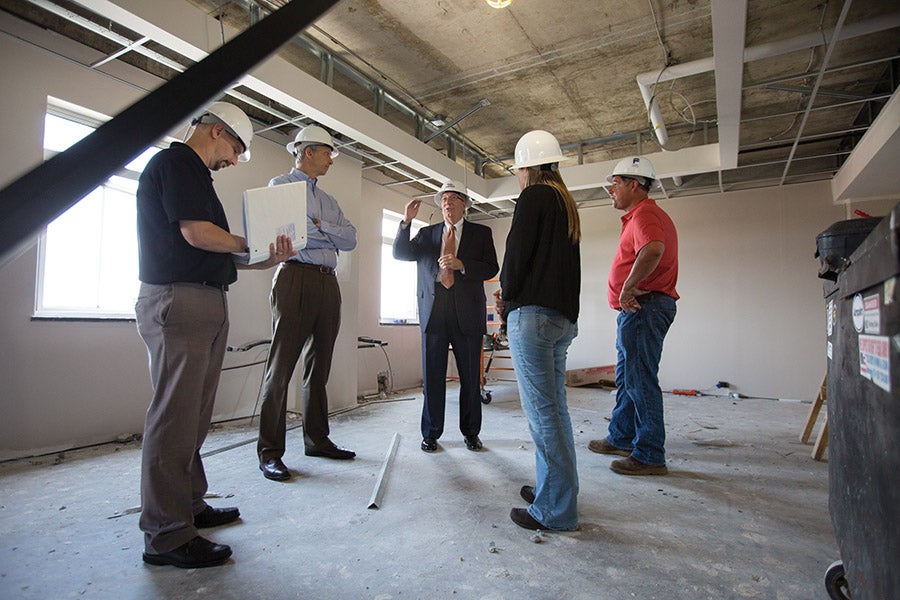
"I don't apologize for the bricks and mortar, because I think they are a part of someone's decision … the equipment, the laboratories. All of those things are a part of what allows us to educate our students."
LN: Throughout your tenure, we have invested nearly $250 million in new facilities and renovations and invested millions in academic programs. You have always said that the physical growth — bricks and mortar — are so much more than that. How has our physical growth benefited and equipped our students to be successful in the future?
RL: First of all, I believe people are going to judge you by the look of the campus. It’s the first impression people often have of an institution. In the educational sector, you're competing with whatever the next campus is down the street and across town, and in another state. And so there has been a remarkable investment in the infrastructure of higher education in terms of buildings and campuses over the last 50 years. But it’s not the end. It’s a means to an end.
I don't apologize for the bricks and mortar, because I think they are a part of someone's decision … the equipment, the laboratories. All of those things are a part of what allows us to educate our students. But if we only had a beautiful campus and nothing else substantial, it would not be very satisfying for very long. I think one of the things we're most pleased about is that — as our admissions recruiters tell us — when a prospective student visits the campus they often say they choose Lipscomb because “it just feels right.” That sentiment comes from how they're treated when they’re here … it also comes from the physical campus … it is the feeling they get when walking around that this is comfortable and feels safe and they think “I can see myself living here.”
I’m looking forward to the vision that someone else will build on that foundation. —
LN: The tremendous growth has been so much more than facilities and physical campus expansion. This is a result of your vision and leadership, but also the result of others buying into it, believing in it and carrying it out. How satisfying is it to see where the university is now and what reflections do you have on how we, as an institution, got here?
RL: There is a deep satisfaction in that we have been able to do substantially more than most people would have dreamed or envisioned that we could. So that's very, very satisfying.
I think God has granted me a sense of some vision. A visionary is always seeing the next thing that could be done, so it is hard to say, “Okay, we got that done. I'm just going to sit here and bask in the joy of having done it.” I wish I was a little bit more that way because it would cause a lot less stress, but I'm not. So I’m always thinking: ‘Now where else can we go?’
I firmly believe this university can be one of the top 10 Christian universities in the nation. There's no reason Lipscomb can't be among that group. We're in a vibrant city, we have a very diverse curriculum, great campus life, we play Division 1 athletics, we have built a relevant campus, we have a strong purpose with thousands of students... there's just no reason that Lipscomb’s next phase can't be to grow into that in a very tangible and appropriate way. So, as a visionary I’m looking forward to the vision that someone else will build on that foundation. The vision that can take us forward.
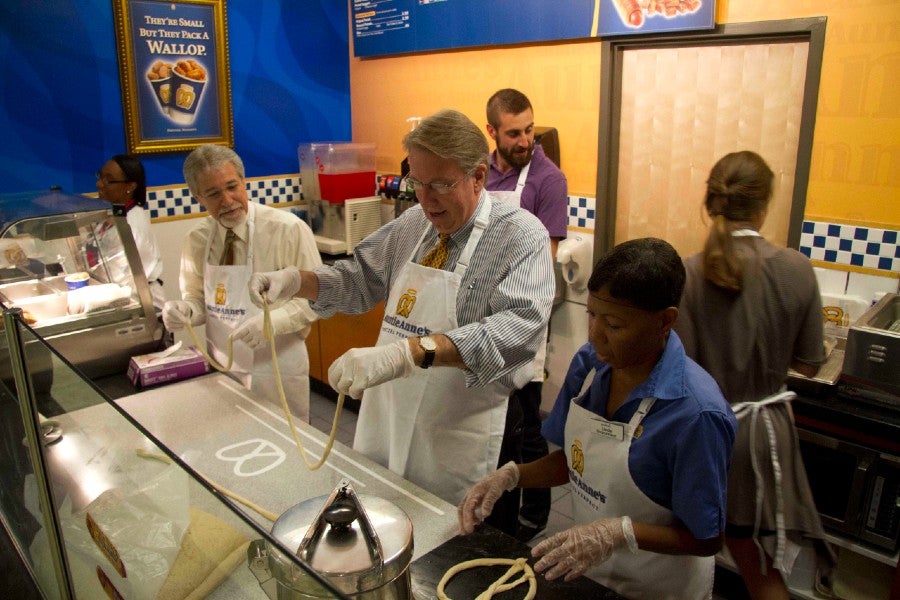
From bringing bagpipes to Allen Arena and Starbucks to the Bennett Campus Center, to serving pretzels in the food court and dancing with Malagasy students in Bison Square, President Lowry was a personal presence in the lives of many students.
LN: Within the last two years 20 months, higher education changed dramatically in response to a very unexpected disruption — the COVID-19 pandemic. But higher ed was already changing in significant ways and continues today. There are major challenges ahead for universities and perhaps even greater challenges for faith-based institutions. What is your assessment of the state of higher education today and Lipscomb’s role in it in the future?
RL: The pandemic has forever altered the landscape of higher education. For a period of time during the pandemic, every student has had to learn online and every faculty had to learn to teach online. The gradual move toward a much more technology-focused enterprise jumped forward with warp speed. It moved us forward about a decade in that respect. The next administration and leadership needs to examine what that means for our piece of this higher education world, and the mission that we seek to walk out? I think there will be some vigorous conversations, because you still have a fairly traditional industry, with folks who are drawn to the stability, control and predictability of that industry… and some of those things have been shaken. It’s exciting, disruptive and invigorating. I think we're going to have to live with some of that tension for quite a while.
Then you add to that layer being a faith-based institution. We are sensing what it's like to be in a much more secular, less religious culture, where the assumptions and worldviews are not the same. I've shared a story several times about an individual, who was aware of all that the university was doing in the community, who said to me, “I really like what Lipscomb is doing in Nashville. I just wish you weren't Christian.” I don't know how to answer that because so many of the things he said he liked about Lipscomb make up who we are because we are a faith-based university. It’s going to get really, really difficult as there are increasing legislative and judicial threats to religious freedom in the country.
LN: And yet, I would think that there's still a really important role for a school like Lipscomb?
RL: Absolutely. I think most people will agree that spirituality is part of human existence. As a faith-based institution, we have the freedom, the desire and the intentionality to also educate that part of the human being. It relates not only to a larger story with God, but it relates to character, to the motivation for service and to how you treat people. We are not going to give that up.
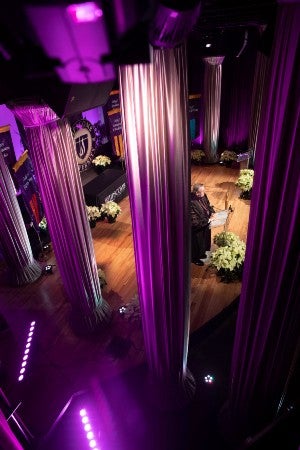
During his tenure, Lowry established the tradition of having bagpipes and a time when he recognized various accomplished students from the stage at commencement.
LN: Commencement is always a special time for you. Why is that?
RL: Faculty and staff work really hard every day, doing their part and contributing to their little slice of the puzzle. Sometimes these little slices are so consuming, you can't fully appreciate the bigger picture. It's in that moment of graduation that I get to pause for five minutes, stand there in that tunnel watching the graduates march in, and I get to appreciate the bigger picture.
We use the word commencement and typically think about the beginning of something. But we also use it to describe the completion of something. I often use a quote by Max Dupree that says: “you can’t be who you need to be if you remain where you are.” Commencement is the moment where we acknowledge that. We use that phrase to congratulate them on coming to Lipscomb four years earlier, and we're using this phrase to send them off.
We have the privilege of having these students as part of our institution for a while, but we know they are on a journey that has them going forth with their competence, with their character, their knowledge and experiences. They go forth carrying with them a bit of who we are. So that's just a special, special feeling.
LN: You have devoted your career to higher education and specifically to Christian higher education. Why?
RL: Education is something that can dramatically change the trajectory of one's life in a relatively short period of time. In our culture, the life of someone who has an education will look very, very different than someone without an education. College is a relatively short period of time compared to one’s lifespan, but the trajectory that this education can set one on can be completely different than it would have been just a few years previously. So it's pretty exciting to be involved in something that can have that much impact on someone's life.
One of our recent graduates shared his story with me. He is from Mexico and his parents said goodbye to him when he was eight years old and came to the United States. In his native country, his mother cleans houses and his father leads a small band. This young man settles in Nashville and goes to a public high school here. Through a series of connections, he ends up at Lipscomb where he earns his undergraduate degree and then completes his master’s degree this year. Now he's gone to work for Nissan. So there's this moment where he goes home and tells his parents that he works for Nissan in logistics, and in just one generation, all their lives have been changed.
I think a lot of people work for their entire careers and never really have much passion for what they end up doing. Education is a place where we can work and have a lot of passion because we see the lives by the thousands who are affected.
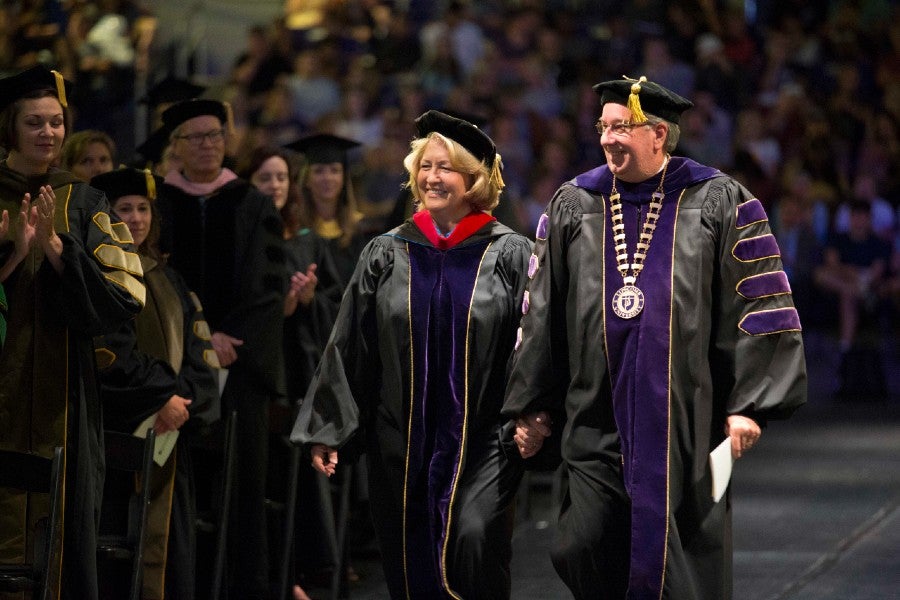
LN: How have Rhonda, the board of trustees and the senior leadership team been strong partners with you throughout your tenure?
RL: I am greatly blessed, and the institution is greatly blessed, to have had an active, vital and engaged Presidential Spouse as Rhonda has been. She is a role model for women and is a great example of someone who takes her giftedness into the place where she finds herself and uses it wisely. She chose to invest that at Lipscomb and for Lipscomb as opposed to investing it somewhere else. She was educated with a degree at a seminary, has been active in the Nashville community and has worked tirelessly for the university. Now, she is chair of the Stephens Christian Trust Fund. She has chosen to invest her time and talent in the university, but she certainly could have invested that same energy elsewhere.
We both had as examples some colleagues and mentors in Christian education who, as couples, worked very closely together. So we've been blessed that we can do that. I like to think of it as God's plan that we, as a presidential couple, have had the opportunity to contribute to the university.
The board of an organization is far more significant in the lives of its constituents than most people understand. Lipscomb’s board is the best university board that I have ever worked for because it understands, clearly, its role as the policymaking body and understands that the administration’s job is to carry out those policies. So when these two pieces understand their roles they work better together.
You want individuals who are on your board to have a passion for the institution and be willing to be brought into a vision. The Lipscomb board has been extraordinarily supportive with their time and with resources. I’m very, very thankful because not all boards are like that. Over the last 16 years we have had good discussions and have rarely had a vote that was not unanimous. And I can't think of a time when we’ve ever had an angry conversation.
What do you think you'll miss the most about this role?
RL: I love putting the pieces together to accomplish something, whether it's an academic program, a new facility or rebuilding something. And I do worry that I’ll miss that a lot. I’ll miss the students, even though in this role you don’t always have the interaction with them that you would like. The students are the reason why we do this. Also, I love the faculty and staff—they are so dedicated and really want to be here as a part of this mission. I'm going to miss them and engaging with this community as president. It has been one of life’s greatest honors to be the president and to represent this institution.
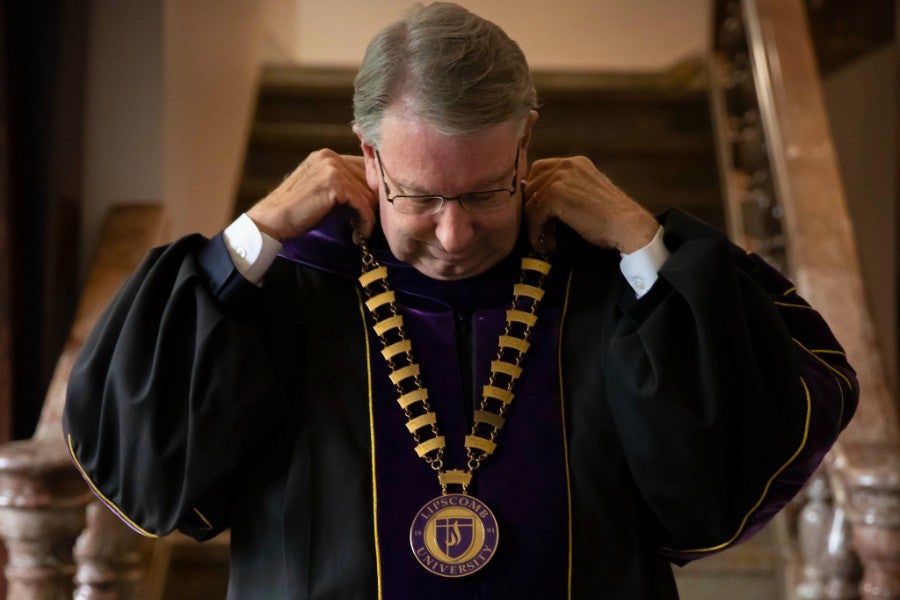
Through this action a president is saying, ‘Now I commit to you.’ I think about that every time I put on my academic regalia. —
LN: What does it mean for you to have been Lipscomb’s president?
RL: There is a symbolic moment that I find fascinating. Most professors with a doctoral degree have a hood which displays the colors of the institution from which you have earned that degree. When you become a college president, however, you exchange them for the new colors of the institution of which you are leading. It’s a very symbolic, but seldom thought about, act. Through this action a president is saying, ‘Now I commit to you.’ I think about that every time I put on my academic regalia… I’m putting on the colors of this university.
As we try to deeply absorb this connection of leadership and service through this symbolic putting on of a school’s colors there is also this sense that we never quite get there… you never quite become the school… not as a faculty member or as a student. In many instances you have not graduated from the institution you lead and by the nature of this position, there is always some level of distance between you and those you lead.
So it seems we are always wrestling with this thing of saying ‘symbolically, ‘I'm putting you on’ but at the same time you also realize that you’re a guest at someone else’s table. You hold in your hands not power, but stewardship. It’s a sense of: ‘How do I hold this institution? How do I guide it but it’s not really mine?’ After holding that role for a long time you get a little insecure because you convince yourself that you’re holding it lightly. But I'm not sure emotionally, it is held quite so lightly. So intellectually, I know it's not mine, but with 16 years of investment, night and day, seven days a week… you can’t help it.
So I ask myself the question, ‘When I'm no longer the president, how much of who I was, and how much of who I will be, is left to be something else?’ This role is a pretty complex thing. I serve in the office of the president, but I have also been formed by the office of president. It has been a joy, an adventure and I hope somewhat worthy of God’s calling.
